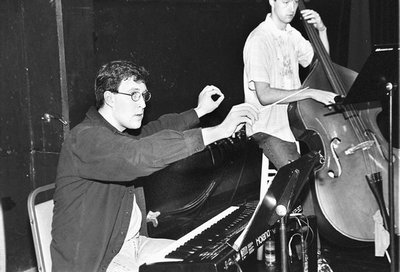May 9, 2002
Graduate student updates 1728 hit Beggar’s Opera
When the UW Opera production of The Beggar’s Opera opens Friday, it will be with a new “musical realization” of the score written by a student. Jake Winkler, a graduate student in conducting, has been laboring over the show’s 40 plus songs for months now, embellishing what was a pretty skeletal score.
“John Gay, who wrote The Beggar’s Opera, was a lyricist, not a composer,” director Claudia Zahn explains. “So he planned for the songs to be sung a cappella, then was convinced by others that he should use some instruments.”
“What he did was to write down a baseline that would go with the melody,” Winkler adds. “And that’s pretty much all we have today — melodies with some baselines. What I have done is fleshed those out some. Then for some songs I’ve completely changed everything except the melody.
The melodies in question are largely those of familiar folk songs. Gay simply borrowed the melodies and wrote his own lyrics to match the story he was telling. The Beggar’s Opera is known as a ballad opera, featuring spoken words followed by songs.
So it’s not surprising that Winkler isn’t the first musician to remake the opera. Benjamin Britten did a new version early in the 20th century, as did Duke Ellington later on. And Kurt Weill turned the show into The Threepenny Opera, borrowing only one song from the original.
So how does a conducting student wind up working on opera music? Winkler studied jazz piano as an undergraduate and did some arranging for jazz combos he played in. And he also served as blocking pianist for past operas, filling in the orchestra parts during rehearsal. So when his piano teacher, Marc Seales, told Zahn about Winkler’s arranging prowess, he was someone she was already familiar with.
“I wanted someone who had a grounding in classical music but who also knew how to do jazz arrangements,” Zahn says. “Marc told me that Jake was a fantastic arranger, so I approached him about doing it.”
Winkler began working on the songs in late December and says he has continued revising them as rehearsals have progressed. “They’re mostly short songs,” he says, “one to two minutes for the most part. But sometimes it took three hours to get an idea for one song, and of course longer to develop it.”
As he went along, Winkler would record what he did using synthesizers and give Zahn a tape. Then the two would meet and discuss what he’d done, after which Winkler would make revisions.
“Jake was very helpful to me in thinking musically,” Zahn says. “It was like working on a new piece, so it was very exciting.”
The two have tried to make the show both of its own time and modern. Debuting in 1728, The Beggar’s Opera tells the story of the fence Peachum and his daughter Polly and of the outlaw MacHeath. It is also a send-up of government, society, marriage and even opera itself. Two of the female characters, Winkler says, are representative of rival opera singers of the time who had actually gotten into a fistfight onstage.
“We’ve represented that musically by having the two sing different songs at the same time in a sort of Dueling Banjos style,” Winkler says.
He’s also managed to combine elements of baroque music, on which the original is based, and modern jazz.
“In some ways baroque and jazz have a lot in common in that baroque has a bass line from which chords are understood or implied, while in jazz you have a bass player playing one thing and then you have a pianist or guitarist filling in chords above that,” Winkler says. “So for this show I have a rhythm section — string bass and drums. But rather than piano I have harpsichord, as they would have had in the 18th century.”
Winkler is compromising, however, by using an electric keyboard rather than a real harpsichord, a quiet instrument that would likely be drowned out by the flute, clarinet, tenor saxophone, bassoon, two violins, viola and cello he’s also included in his chamber orchestra.
Winkler says he’s put hundreds of hours into the opera, for which he’s receiving credit and a stipend. But the real payoff is what he’s learned. “I’ve gotten a lot of confidence in my ability to come up with a musical idea and develop it in an interesting way,” he says. “You know how they say, 1 percent inspiration, 99 percent perspiration. Well, I’ve gotten a lot more comfortable with the perspiration part.”
“I think what Jake has done is terrific,” Zahn says. “He got more musically adventurous as he went along, and it just got better and better.”
The Beggar’s Opera plays at 7:30 p.m. on May 10, 11, 15, 16, 17 and 18 and at 3 p.m. May 12 and 19 at Meany Studio Theatre. Tickets are $20 ($10 for students and seniors) and are available at the Arts Ticket Office, 206-543-4880.



